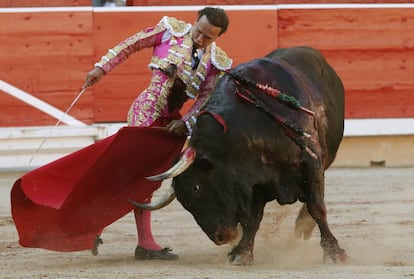The Running of the Bulls without bullfights? Pamplona mayor says it’s possible
Joseba Asirón draws industry ire after suggesting “corridas” could disappear in the not-so-distant future

Joseba Asirón, mayor of Pamplona since 2015, is a member of the Basque radical nationalist party EH Bildu. Every July 7, at the beginning of the world-famous Sanfermines, he sits in the main box at the bullring to preside over the day’s fight.
However, in an interview published on Monday in the Valencia magazine El temps, Asirón provoked a heated reaction from bullfighting supporters. “I don’t see a Sanfermines 100% bull-free, but what I do envisage in the foreseeable future is a Sanfermines without the bullfighting,” he declared.
Nobody can imagine a form of entertainment based on animal cruelty
Pamplona Mayor Joseba Asirón
Asirón defended the early-morning runs through the streets of Pamplona that have earned the northern Spanish city international fame, describing them as a “mark of identity.” But he added that “with regards to the future, nobody can imagine a form of entertainment based on animal cruelty.” On Wednesday, he reiterated that “society understands this more clearly everyday.”
The doubts voiced by the mayor caused an immediate reaction from the bullfighting industry and breeders alike. The latter demanded that he take back what he said and warned that “the possibility of celebrating the Running of the Bulls without the subsequent fight could simply not exist in Pamplona.”
The mayor replied by calling the breeders’ opinion “very respectable.” However he indicated that there is already “quite clearly” a social debate underway over bullfighting, even in Pamplona, although for now “it is objectively not conceivable to have Sanfermines without bulls. I cannot imagine any mayor coming along and just abolishing this practice by decree.”
The origins of bullfights
It is difficult to date exactly when bullfighting came about, although there are documents that report the existence of the practice in Pamplona as far back as the early 15th century. Subsequently, the custom of running in front of the herd began when the bulls were moved from the outskirts to the bullring, first in what is the current Plaza de Castillo and then in the two arenas located in the city center: the current one and the one that existed until the early 20th century in a similar location.
There are other towns in the Navarre region whose festivals include the bull-running without the fighting. Other festivals have adopted the use of other animals. In the locality of Tordesillas, in Valladolid province, the controversial Toro de la Vega no longer takes place. This exercise traditionally involved the townspeople chasing the bull around the town and lancing it to death.
English version by John Clarke.
Tu suscripción se está usando en otro dispositivo
¿Quieres añadir otro usuario a tu suscripción?
Si continúas leyendo en este dispositivo, no se podrá leer en el otro.
FlechaTu suscripción se está usando en otro dispositivo y solo puedes acceder a EL PAÍS desde un dispositivo a la vez.
Si quieres compartir tu cuenta, cambia tu suscripción a la modalidad Premium, así podrás añadir otro usuario. Cada uno accederá con su propia cuenta de email, lo que os permitirá personalizar vuestra experiencia en EL PAÍS.
¿Tienes una suscripción de empresa? Accede aquí para contratar más cuentas.
En el caso de no saber quién está usando tu cuenta, te recomendamos cambiar tu contraseña aquí.
Si decides continuar compartiendo tu cuenta, este mensaje se mostrará en tu dispositivo y en el de la otra persona que está usando tu cuenta de forma indefinida, afectando a tu experiencia de lectura. Puedes consultar aquí los términos y condiciones de la suscripción digital.








































